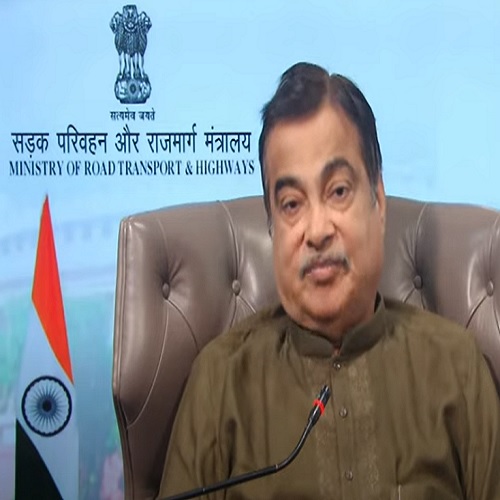New Delhi [India], January 30 (ANI) The government is progressing on the policy of adopting import substitutes, cost-effective, pollution-free and indigenous fuels for the transport sector, Union Minister of Road Transport and Highways Nitin Gadkari said on Monday.
More than nine lakh vehicles, owned by central and state governments, transport corporations and public sector undertakings, that are older than 15 years will go off the road from April 1 and new vehicles will replace them, Nitin Gadkari also said.
The minister also underlined the steps taken by the government to facilitate the use of ethanol, methanol, bio-CNG, bio-LNG electric vehicles, hybrid electric vehicles and hydrogen fuel cells, while constantly revising emission norms to reduce pollution.
Speaking during a FICCI conference, ‘Future of Mobility: India’s Journey towards Net Zero’ on Monday, Union Minister Gadkari also alluded to “making farmers as Urjadata (producer of solar power) along with Annadata (food-giver)”. He cited an Indian Institute of Science’s project that successfully demonstrated hydrogen production using biomass. This technology has the potential to transform the rural economy in India completely, the Minister said. He added, “in this model, the farmers can produce green hydrogen and supply that as a fuel to heavy-duty buses and trucks”.
Additionally, he highlighted flex engines — which can run on 100 per cent bioethanol or petrol — as another opportunity to “increase agriculture income”. “I have given a target to the auto industry to develop India’s first BS-VI compliant flex engine and launch it in India,” he added.
Gadkari underlined a Russian technology that successfully managed “managed to make the average of ethanol equal to petrol”, according to a statement released by FICCI on Monday.
The Minister emphasised using bio-CNG as a vehicular fuel. He highlighted that bio-CNG is a cheaper and less polluting substitute over diesel, noting the availability of surplus rice ‘parali’ for conversion into bio-CNG. “Five tonnes of rice straw gives one tonne of bio CNG,” he said.
Further, Gadkari underscored the plans to “make an electric highway”. He added, “We have a meeting with a scientific adviser of the Prime Minister, and we are planning to make the e-highway from Delhi to Jaipur as a private pilot project by which we can use electric buses, trucks, trolleys, buses and reduce the logistics costs.”
On occasion, Subhrakant Panda, President, FICCI, and Managing Director, Indian Metals and Ferro Alloys, noted that India’s transition to clean and green technologies and fuels is essential. He emphasised incorporating a wide-ranging suite of solutions for decarbonising the transportation sector. These include gradually shifting to electric mobility, biofuels, hydrogen fuel cells, and natural gas to meet the net zero targets. Furthermore, FICCI President stated the “future of mobility is collaborative”, and “all stakeholders, including the central and the state governments, industry, and consumers, need to come together to adopt a mixture of several green solutions combining for a greener, cleaner future”.
Panda also spoke on the recently approved National Hydrogen Mission. He noted it would be instrumental in enabling India to gain global leadership and reduce its carbon footprint. “It will also result in a cumulative reduction in fossil fuel imports of over Rs 1 lakh crore and abatement of nearly 50 million tonne of annual greenhouse gas emissions by 2030,” he said.
Mike Orgill, Head of Public Policy (Asia Pacific), Uber, noted that transport emissions have grown faster over the past three decades and are among the most significant contributors to global climate change. He emphasised the need for bold policies worldwide to remove barriers and make electric vehicle EV adoption feasible. Orgill suggested a three-pronged approach — firstly, developing the appropriate charging infrastructure; secondly, ensuring the availability of affordable and second-hand EVs; and thirdly, financial incentives to close the interim gap. He also noted that the growth of shared mobility is essential to achieve net zero targets.
Amit Kumar Ghosh, Additional Secretary, Union Ministry of Road Transport and Highway and Arun Chawla, Director General, FICCI, also spoke on the occasion. (ANI)












